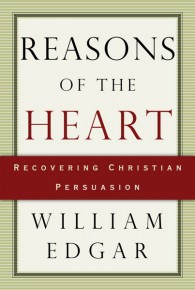If Jesus is the answer, what’s the question?

Dr. William Edgar has written about the eclipse of Christian apologetics. A significant part of this eclipse results from our retreat, as Christians, into our own cultural enclaves. Here, we develop subculture identities that isolate us from engaging the cultural realities of the world in which we live. In short, much of what happens in the world around us irrelevant to what we are about.
But when we see the world around us as irrelevant to what we’re about, the world is more than willing to return the favor. Writing about what he calls the “credibility gap,” Dr. Edgar describes our current dilemma.
[The] Christian message seems irrelevant—followers of Christ have wonderful answers to questions people seem not to be asking. We feel like someone selling the latest, most efficient equipment for doing alchemy. The sales pitch may be as good as the wares, but no one is interested because no one practices alchemy.
This is the climate into which the hour of apologetics has arrived. Although commending the faith may be difficult, it is crucial for the survival of the church and the spread of the truth. We long to make an impact and a difference in our society, but are faced with a credibility gap between the gospel of Christ and our culture. Every age experiences this tension, yet at the dawn of the twenty-first century the distance seems greater between the message and the audience than previously. Why is this so?
It is partly, no doubt, because Christians have grown so used to their own language, terms, and culture that they have become isolated from those who surround them. A great British preacher used to tell his congregation that the interests dearest to the hearts of believers are peripheral to unbelievers, and that the thing most important to unbelievers are insignificant to followers of Christ. He was describing what he considered normal and good. But how healthy is it for Christians and non-Christians to live in such different worlds?
The credibility gap between believers and skeptics is often highlighted for me in church. Occasionally in the Sunday service I try to imagine a particular friend beside me in the pew. What impact would the sermon have on Michael, my Jewish neighbor? Or on the beer-drinking sports fan I met at a baseball game with his sports outlook, “Life is short, play hard”? Or on Mr. Mukerji, a visiting Hindu friend who delighted the children with stories of his travels and who consider his religion an accident of birth? What would church mean to these people, with it “language of Zion”? What would they make of the issues that are so real to me, a Christian, but are undoubtedly foreign to their world?
In this passage, Dr. Edgar reflects an assessment made by one of his most important teachers, the late Francis Schaeffer. Schaeffer’s critique of Evangelicals living in their Christian ghettos was framed as a question, “If Jesus is the answer, what’s the question.”
Helping Christians get out of their ghetto mentality is one of the objectives of Reasons of the Heart: Recovering Christian Persuasion, an introductory book on apologetics by Dr. Edgar. In the first part he explains what apologetics is and why it is a needed. In the second part, he deals with some of the barriers to belief. Highly recommended!
Dr.William Edgar is professor of apologetics at Westminster Theological Seminary, as well as an ordained minister, a musicologist, and a jazz musician. He is co-editor, with Scott Oliphint, of a two volume collection of apologetic writings from the New Testament era to the present: Christian Apologetics Past and Present (Volume 2, From 1500): A Primary Source Reader Hardcover.


 February 6, 2014
February 6, 2014 







Great reminder! I love the phrase about “Evangelicals living in their Christian ghettos.”